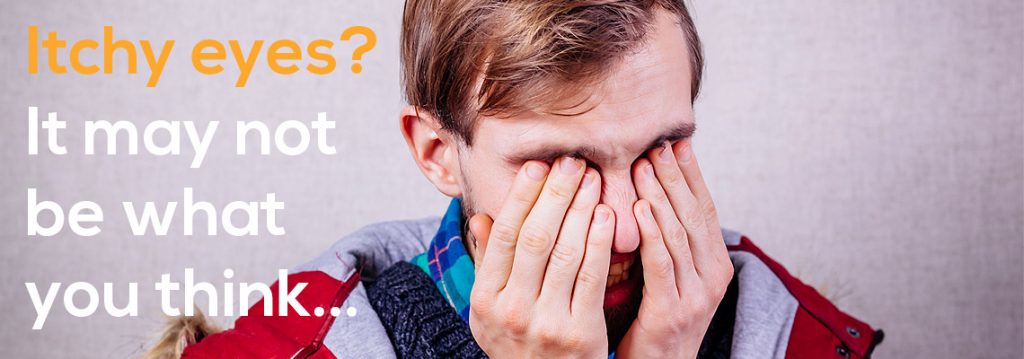If you’ve ever had the sniffles around this time of year, you’ll know the feeling. The runny nose. The scratch in the throat. The sneezing. And of course the red, itchy eyes.
As an ophthalmologist, I take a particular interest in that last symptom. Itchy eyes are an obvious indication that something is awry. And at this time of year, you don’t have to be an eye doctor to divine an obvious culprit: hay fever. After all, it’s very common. Around 10% to 30% of British adults suffer from it in some way. And once the familiar symptoms begin to kick in, so does the familiar routine. Pop to the pharmacy. Buy an over-the-counter remedy. Hope for some relief.
There are a number of different things that can cause our eyes to become red and itchy.
All of which would be OK… if hay fever was always the reason for itchy eyes.
Except that it isn’t.
In fact there are a number of different things that can cause our eyes to become red and itchy. So what else might be behind the problem? Let’s explore some possibilities.
Itchy eyes? It could be an allergy…
As that hay fever stat indicates, allergies are very common – and indeed on the rise. According to the charity Allergy UK, around 44% of British adults suffer from one. And in the two decades to 2012, the rate of hospital admissions for anaphylaxis increased by 615%. Those are big numbers.
One key part of the eye that tends to get most affected by allergens is the conjunctiva. This is the membrane covering the white part of your eye. It’s thin and delicate. And it’s apt to become irritated by pesky airborne particles – like the pollen from common-or-garden rye grass (Lolium perenne), a classic cause of hay fever.
When an allergen irritates the conjunctiva, it becomes inflamed – essentially because the body’s immune system is fighting off a perceived threat. So the eyes turn red or pinkish, and they can feel watery, itchy or ‘gritty’. We call this condition conjunctivitis.
Seasonal allergic conjunctivitis occurs at the same time of year – typically from March to July – so pollen would be the primary suspect (though mould can also be a factor). Perennial conjunctivitis, on the other hand, occurs all year round. And here we would suspect a rather different cause. Step forward the humble house dust mite. Or, to be more precise, the humble house dust mite’s faeces.
Step forward the humble house dust mite.
These particles are exceptionally small (the mite itself is only 0.2mm from top to tail). And they are also pretty much everywhere in our homes, especially our bedrooms and mattresses. Where mites are the indeed the problem, you would expect poor sleep, and sore eyes after waking. In this case, a good doctor would suggest more than eye drops. Changing pillows, putting on anti-allergy dust covers, and even removing soft furnishings from the bedroom can all make a big difference.
But it’s just possible that itchy eyes could indicate some other, rarer allergic conditions. Two of the more severe ones are vernal keratoconjunctivitis (VKC) and atopic keratoconjunctivitis (AKC). With VKC you would expect a very thick mucus discharge, often described as a rope-like mucus. This is accompanied by papillae, small bumps filled with inflammatory cells that form under the eyelids. AKC is often associated with dermatitis. And in most cases it will be associated with eczema and asthma, too. Here the potential problems can be sight threatening, so specialist treatment – perhaps with an immunosuppressant, or even surgery – is essential.
It could be something else entirely…
As you may have guessed by now, itchy eyes aren’t only caused by allergens. In fact they could mean that something completely different is going on.
Let’s take a fictional scenario.
You wake up in the morning and notice that your eyes feel sore. Glancing in the mirror, you find that your eyelids look slightly red and swollen. Your eyes may also feel sticky, or tacky. Describe these symptoms to an eye specialist and they will already be collaring the likely offender: blepharitis.
Blepharitis is a condition, and a common one. Essentially, it’s caused by an imbalance of oils in the skin. For adolescents, that’s likely an overproduction of oil; for older people, an underproduction. In either case the effect is the same: oil clogs up on the eyelids, and this encourages the growth of Staphylococcus bacteria, or very tiny mites called Demodex. They in turn cause your eyes to feel irritated.
Many people assume that red-rimmed eyes are perfectly normal – especially in the mornings.
Many people assume that red-rimmed eyes are perfectly normal – especially in the mornings. But they aren’t normal. And they can and should be treated properly. For blepharitis, we would typically prescribe pre-soaked cleaning pads, gels, foams and heat pads. Or we might suggest Microblepharo Exfoliation (MBE) – a kind of eyelid deep-clean that blasts off excess oil. This is particularly helpful for elderly patients who might struggle to clean their eyelids with cotton wool buds or foams.
But there is one other common condition that we haven’t yet covered, and that’s dry eye syndrome. Again, symptoms will be similar: red, slightly itchy eyes, often with a feeling of fatigue. And here the cause is underproduction of tears. Each time we blink, our tear film is refreshed. But if the film doesn’t refresh properly, the nerves around the cornea become irritated. Meanwhile, that pure refractive surface is broken up. And this leads to impaired vision, because the light starts to hit your cornea at irregular angles.
There’s plenty that can be done to help dry eyes.
Anyone can suffer from dry eyes, but older people are more likely to be affected – an estimated one in three people over the age of 65 get the condition. Women of menopausal age are also more susceptible, since hormonal changes can affect tear production. (As an aside, the rise of smartphone screens and iPads is also leading to a surge in dry eye issues, but that’s a blog story for another day…)
Fortunately, there’s plenty that can be done to help dry eyes. We can prescribe a course of eye drops. In some cases we would recommend tear duct plugs; these are tiny silicone ‘covers’, easily applied in the clinic, which block one or two of the ducts and increase the natural tear filter.
Either way, get help…
When it comes to itchy eyes, there is a simple Do and a simple Don’t.
Don’t rub the itch to soothe the irritation – rubbing can introduce infections and foreign bodies. And it doesn’t solve the underlying problem.
Do get a proper diagnosis. I’d recommend visiting an ophthalmologist for two reasons. One, they have access to specialist equipment that will determine the exact cause of the itchiness. So you’ll get a full and comprehensive eye examination from the get-go. Two, they will be able to prescribe a wider range of solutions once the cause has been determined. That means precision-guided treatment, whatever the condition. Which is good news for tired eyes everywhere.
Even if the culprit happens to be hay fever.
Medical Disclaimer
This article is for information purposes only and should not be considered medical advice. If you or any other person has a medical concern, you should consult with your health care provider or seek other professional medical treatment. Never disregard professional medical advice or delay in seeking it because of something that you have read on this blog, website or in any linked materials.





